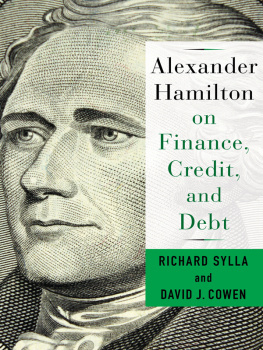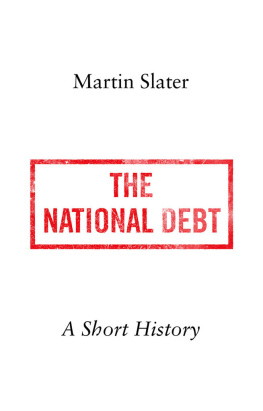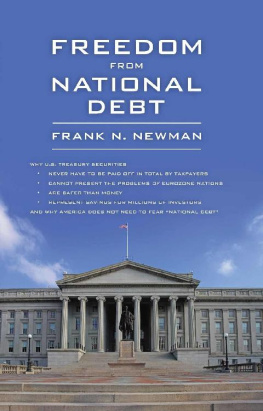
HAMILTONS BLESSING
The Extraordinary Life and Times
of Our National Debt
John Steele Gordon

Walker & Company
NEW YORK
To Eleanora Gordon Baird,
to whom I am much indebted,
with love
The sinews of war are infinite money.
CICERO, Orationes Philippicae
Annual income twenty pounds, annual
expenditure nineteen nineteen six, result
happiness. Annual income twenty pounds,
annual expenditure twenty pounds ought
and six, result misery.
CHARLES DICKENS, David Copperfield
A national debt, if it is not excessive,
will be to us a national blessing.
ALEXANDER HAMILTON
A billion here, a billion there, and pretty
soon youre talking about real money.
SENATOR EVERETT DIRKSEN
CONTENTS
I N 1790 A British journalist, searching for a way to bring home to his readers the size of his countrys national debt, seized upon an image that has a distinctly modern ring to it. The debt, he wrote, is of a sum which the human mind can hardly form an impression. Were it to be laid down in guineas in a line, it would extend upwards of four thousand three hundred miles in length.
At the time, the British national debt amounted to 272 million, a sum roughly as awesome in the economic universe of the late eighteenth century as the $11 trillion debt of the United States is in the early twenty-first. After all, at that time 500 a year was a handsome income, allowing its recipient to live a life of relative comfort; 10,000 in capital made a man rich in the eyes of his contemporaries.
The size and steady increase of the debt certainly invoked in the British population, or at least the small portion of it that then concerned itself with politics, the same queasy feelings the American body politic has had in recent years as we have watched our national debt climb to once undreamed-of heights. In 1700, at the end of the Nine Years War, the British national debt had stood at only 16.7 million. By 1720 it had risen to 50 million. In 1748 it reached 76 million; in 1763, 131 million. The expenses of the American Revolution then increased it to 245 million by 1784.
Certainly the example of Spain was fresh in the minds of British political and economic thinkers. In the sixteenth century, Spain had been the greatest power in Europe. But despite the cash cow that was its American empire, producing, year after year, prodigious quantities of gold and silver, Spain was increasingly burdened by debt, and its freedom to pursue its interests by military or economic means was thus increasingly limited. By the end of the eighteenth century, Spain was barely clinging to Great Power status and, shorn of its empire, would soon sink to the level of a backwater.
But although critics of the debt had been forecasting the ruination of the British state for generations by that time, in fact British power and prosperity had been growing quickly throughout the eighteenth century. Before the Glorious Revolution of 1688, Britain had been no more than a marginal military and economic power, with only a few tenuous colonies in the Americas. As late as the 1660s, the Dutch navy had dared to sail right into the Thames Estuary, where it burned five British men-of-war and seized the Royal Charles, the British ship-of-the-line that had carried King Charles II home from exile in 1660. The British army at the time was of even less consequence than the navy.
Yet 100 years and 272 million of debt later, Britain had become the linchpin of European politics, the Royal Navy was supreme at sea around the world, and the sun had stopped setting on the British Empire. The British economy grew strongly during this period as well, with national income more than doubling (although, to be sure, the distribution of that income remained highly skewed toward the upper classes). By 1790 the Industrial Revolutionfortuitously born in Britain a few decades earlier was rapidly increasing the rate of growth of its economy. It would, in the next half century, make Britain the modern worlds first superpower, although the Napoleonic wars, which occurred at the same time, caused the national debt to further increase to no less than 844 million by 1819.
Clearly Britains experience in the eighteenth century proves that the size of a countrys national debt is not necessarily inversely correlated with its power and prosperity. Far from it. Instead, the British experience demonstrates that a national debt, properly funded and serviced, can be a potent instrument of national policy.
The secret, of course, is in the funding and servicing. Spains debt had been in both form and substance a personal debt of the king, mostly owed to foreign bankers, who lent short-term. More, the tax system of Spain and the other major European countries was chaotic, arbitrary, and wildly inefficient, making timely payment of interest on the debt doubtful. It is estimated that less than half the taxes being paid by the French people in the 1780s, at the end of the ancien rgime, ever reached the French treasury. The rest went into the pockets of the independent tax farmers who gathered them.
But Britain had turned its tax farmers into bureaucrats at the same time it had created a national debt in the modern sense, one funded largely by long-term bonds (and some, called Consols, that never mature) that could be traded in the marketplace. These bonds, in turn, served as collateral for loans to their owners. The effect was to greatly liquify the national wealth, allowing it to flow much more easily to where opportunity beckoned and to fund the costs of an expansionist foreign policy.
Thus no other country in Europe was able to match Britains ability to marshal so much of its national wealth for the purpose of waging war, while disrupting its national economy so little. For instance, because of Britains ability to raise cash, the government could hire foreign soldiers to fight many of the countrys battles (such as the Hessians who fought in the American Revolution). This practice both overcame the disadvantage of Britains relatively small population and kept domestic political pressure against an expansionist foreign policy to a minimum when casualties were high.
Such economic flexibility, as much as the strength of its arms and the quality of its generals and admirals, allowed Britain to end up on the winning side of so many wars, and to recover so quickly from the war it unequivocally lost, the one that brought forth the United States of America.
So is the current concern about the American national debt overblown? The debt of the U.S. government, considered as a percentage either of Gross Domestic Product (usually called GDP, it is the sum of the goods and services produced within our borders) or of federal revenues, is nowhere near as high as was the British national debt in 1819, the year Queen Victoria was born and when Britain was, in the words of the late historian Cecil Woodham-Smith, within sight of the heights of power and of wealth from which it was, briefly, to dominate the world.
I think not. It is not that the size of the debt itself is the problem. A country as rich and productive as the United States can afford to service its present debt, just as Britain could afford its debt in 1819. After all, our debt was nearly twice as high, relative to GDP, immediately after World War II, when the nation stood on the brink of a vast economic expansion. Instead, it is the recent trend that is ominous. For that trend results not from a deliberate political decision to spend in deficit, but rather from nothing more than the sum of myriad decisions regarding taxing and spending that, collectively, now substitutes for fiscal policy. In a very real sense, the federal government
Next page














